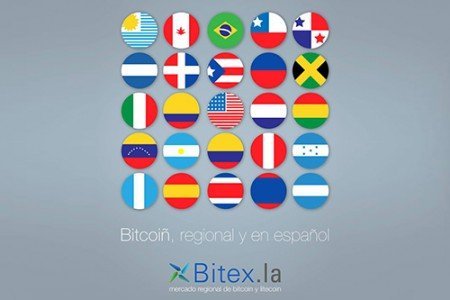[ad_1]
Bitex.la, a bitcoin/litecoin exchange based in Buenos Aires, has officially announced the launch of the first exchange in Latin America.
Bitex.la, a real-time bitcoin and litecoin exchange based in Buenos Aires, has officially launched with $2 million in investments and is looking forward to provide an internationally competitive bitcoin trading platform to Latin America.
During the company’s soft launch in March, company made an introduction to a wider area in Latin America that it plans to target. Bitex.la exchange mentions that it aims to expand to more countries, it has already gathered customers in Colombia, Mexico, Spain and the US.
Moreover, the exchange will also be operating in its home market – Argentina, where exists a developing bitcoin ecosystem that could prove to become an integral support for the industry.
Francisco Buero, the chief operating officer of the exchange, said that the company will be aimed to become a trusted digital currency trading and banking alternative to the already strong local market.
“We’re going to [be] launching a trading API in the following months, and we’re investigating and trying to set up better ways for people to fund their accounts, so most of the money is going to go to new markets in Latin America,” Mr. Buero mentioned.
The mission of Bitex.la is supported with a $2 million investment from an investment company in UK.
Potential risk
Taking into the account the fact, that just now major Latin American markets are paying attention to bitcoin, Bitex.la is trying to reduce the risk it faces by being one of the first on the market. Central Bank of Argentina issued a warning to local investors of the risks in using digital currency.
Therefore, the exchange is operating in Buenos Aires and also incorporating in Netherlands in order to secure itself, Mr. Buero explained:
“Latin America doesn’t have a clear picture about how to regulate bitcoin. It’s not as safe or convenient to set up a [bitcoin] business in Latin America. We don’t want to be a victim to the whims of all the regulators in these countries yet.”
Bitex.la hopes to negotiate the existing regulations in both markets differently.
Emphasizing user experience
Mr. Buero noted that Bitex.la is currently willing to work with payment processor AstroPay, which would make it possible for the exchange to streamline how the users will interact with its website. Furthermore, Bitex.la has plans to work with such providers as Western Union and MoneyGram.
But the company is still experiencing banking problems:
“Right now, the main funding option that people are using is international bank transfer. We are offering OKPay through AstroPay, which in turn goes through Egopay. It’s a very cumbersome process, people are not actually using that since it takes so much time to get the money to us, so they’re just using bank transfer.”
Buero believes that with the use of AstroPay, the process will be more simple: ”We will offer you a button that says ‘Fund through AstroPay’. Then, you can set the amount and your payment method.”
Building trust
The company is also trying to secure its customer funds and signifies that it will use technological standards such as SSL and AES-256 cryptographic encryption Moreover, all the deposits will be held in cold storage.
Furthermore, it became easier for new users to enroll. First an ID should be uploaded to the website, then the photo is validated to meet the required standards, and after that the customer can fund their accounts.
Buero admits the challenge of creating awareness around his company and adds that Bitex.la is using Google and Facebook to target its customers.
Francisco Buero says:
“We are going after those guys one by one and that’s how we’re building most of our exchange’s volume right now.”
Such an approach can be successful, due to volatile local currency could make bitcoin an everyday payment option.
next

Konstantin has always been at the forefront of the global virtual currency scene since first discovering cryptocurrencies the same year that Satoshi Nakomoto created bitcoin in 2009. Konstantin is the owner of a number of small businesses in trucking and mobile development, and co-founded CoinSpeaker in 2014. He graduated from Belarusian State University in 2009 with a degree in Mathematics and Mechanics. You can contact Konstantin via [email protected]
[ad_2]
Source link

